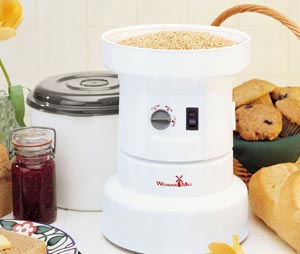In our series featuring Why People Do Food Storage we touched briefly on allergies as one of the “health benefits” of doing food storage. (Please note: Our final article in that series will be posted later this week!) We wanted to go into a little more detail about that since we get quite a few readers asking us what to do if they have wheat allergies since wheat is one of the items we are supposed to store the most of according to traditional food storage calculators. We have two basic recommendations or suggestions for you:
1. Store extra of the other grains
 According to food storage calculators, one adult should store 300 lbs of grains for a one year supply of food. Of this 300, half of it is supposed to be wheat. If you have a wheat allergy, obviously this is not going to apply to you. You may choose to store a lot more alternative grains which include oats, gluten-free quinoa, millet, amaranth, rice, or cornmeal. You can start to collect food storage recipes that use these grains instead of focusing on the traditional items like breads, etc.
According to food storage calculators, one adult should store 300 lbs of grains for a one year supply of food. Of this 300, half of it is supposed to be wheat. If you have a wheat allergy, obviously this is not going to apply to you. You may choose to store a lot more alternative grains which include oats, gluten-free quinoa, millet, amaranth, rice, or cornmeal. You can start to collect food storage recipes that use these grains instead of focusing on the traditional items like breads, etc.
2. Learn how to make substitutions
 A lot of recipes that call for wheat flour can be modified for wheat allergies. For example, cream of chicken soup or any white sauce base recipe can be made using bean flour. You can make gluten-free bread using other flours such as rice flour, millet flour, oat flour, etc. If you own a wheat grinder then these types of substitutions are SO easy to make and you can store the bulk grains in your food storage, just like you would store wheat! For a great summary of different types of gluten-free flours check out this post on the Gluten Free Mommy blog.
A lot of recipes that call for wheat flour can be modified for wheat allergies. For example, cream of chicken soup or any white sauce base recipe can be made using bean flour. You can make gluten-free bread using other flours such as rice flour, millet flour, oat flour, etc. If you own a wheat grinder then these types of substitutions are SO easy to make and you can store the bulk grains in your food storage, just like you would store wheat! For a great summary of different types of gluten-free flours check out this post on the Gluten Free Mommy blog.
We need your help!
We would love to compile some even more in depth resources for people who suffer from Celiac Disease or others who need to follow a gluten-free diet. If you have good food storage recipes or other tips on how to do gluten-free food storage please email them to info@foodstoragemadeeasy.net. We will be incorporating all of your feedback into a helpful handout that will hopefully benefit a lot of people who are trying to live gluten-free AND work on food storage!

-Jodi Weiss Schroeder
http://foodstoragemadeeasy.net

